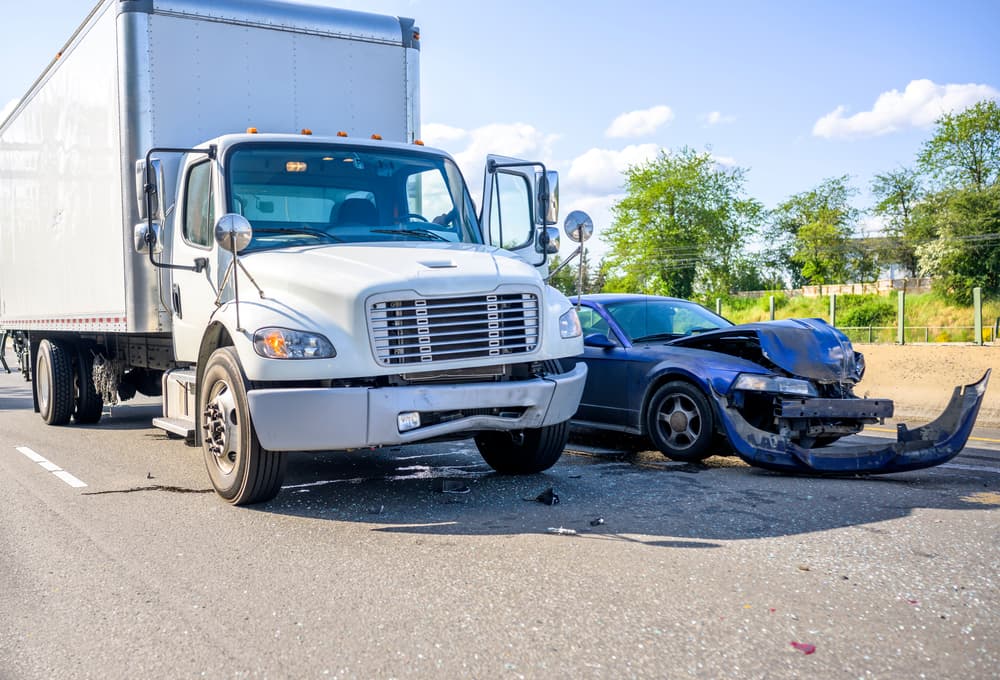Truck accidents frequently happen when truck drivers violate traffic laws, drive recklessly, or engage in distracted driving. Moreover, these accidents can also occur when trucking companies are negligent, such as by failing to follow state or federal motor carrier regulations.
If you suffered injuries in a recent trucking accident, you may be eligible for compensation from an insurance company. Initial settlement offers from insurance carriers in truck accident cases are often low. This is because insurers frequently aim to minimize their financial liability and maximize profits. Consequently, they may offer a low amount, hoping the accident victim will readily accept it without questioning its adequacy. Secondly, they may downplay the extent of the victim’s injuries or damages, hoping to save themselves money on payouts.
Insurers may also exploit the victim’s vulnerability and lack of legal knowledge to pressure them into accepting a subpar offer. Lastly, by offering a low initial settlement, insurers can gauge the victim’s willingness to negotiate and potentially settle for less than they deserve.
In most cases, initial settlement offers from insurance companies should be rejected. However, a skilled truck accident attorney in your area can aggressively negotiate with insurance company adjusters on your behalf – or explore litigation options for your case – in pursuit of the full financial recovery you deserve.
How do Truck Accidents Happen, and Who is Responsible for Them?
Truck accidents are a tragic reality on local roads, often stemming from negligence on various fronts. One primary cause of truck accidents is driver error. Long hours behind the wheel can lead to fatigue, affecting judgment and delaying reaction times. Distracted driving is another common cause, as truckers may be tempted to use their mobile devices or engage in other distractions while operating their vehicles.
Moreover, inadequate training can contribute to truck accidents. Trucking companies may cut corners on training expenses, leading to drivers who are unprepared to handle the complexities of maneuvering large vehicles in different road and weather conditions. Inadequate maintenance is another significant factor. Trucks require regular upkeep to ensure that brakes, tires, and other crucial components are in optimal condition. Failing to maintain these can result in catastrophic accidents.
Additionally, overloaded or improperly loaded trucks pose a considerable risk. Exceeding weight limits can strain braking systems and make it more challenging to control the vehicle, especially when traveling downhill or in emergencies. Improperly secured cargo can shift during transit, throwing off the truck’s balance and potentially causing it to overturn.
Responsibility for truck accidents often extends beyond just the driver. Trucking companies may be liable for accidents that their employees cause if they (the company) fail to provide adequate training, enforce safety protocols, or properly maintain their fleet. In some cases, shippers or manufacturers may also share responsibility if the accident resulted from improperly loaded or defective cargo.
Furthermore, government agencies responsible for regulating the trucking industry can also be implicated. These agencies may face scrutiny and legal action if lax enforcement of safety regulations or inadequate oversight contributed to an accident.
If you suffered injuries in a trucking accident that resulted from driver or company negligence, an experienced truck accident attorney can explain your rights and options and take the appropriate legal action on your behalf.
Medical Complications that May Arise from Truck Accidents

Truck accidents can result in severe medical complications for those involved, ranging from minor injuries to life-altering conditions. One of the most common complications is trauma. The sheer size and weight of trucks mean that collisions can exert tremendous force upon occupants of smaller vehicles, leading to injuries such as broken bones, lacerations, and internal organ damage.
Traumatic brain injuries (TBIs) are another common consequence of truck accidents. Even with modern safety features like airbags and seat belts, the violent force of a collision can cause the accident victim’s brain to strike against their skull, resulting in concussions and other severe forms of TBI. These injuries may lead to long-term cognitive impairment, memory loss, and changes in behavior or mood.
Spinal cord injuries are also common in truck accidents, often resulting from the abrupt deceleration or impact forces involved. Damage to the spinal cord can lead to paralysis or loss of sensation and motor function below the injury site. Depending upon the severity and location of the injury, individuals may require extensive rehabilitation and lifelong care to manage their condition.
Whiplash is a soft tissue injury frequently seen in rear-end truck collisions. The sudden, jerking motion of the accident victim’s head and neck can strain muscles, tendons, and ligaments, leading to pain, stiffness, and reduced range of motion. While whiplash is generally considered a “less serious” injury, it can still cause significant discomfort and may require weeks or even months of treatment to resolve fully.
Psychological trauma is another complication that can arise from trucking accidents. The emotional effect of surviving a traumatic event can manifest in various ways, including post-traumatic stress disorder (PTSD), anxiety, depression, and other mental health disorders. These conditions can significantly alter an individual’s quality of life and may require medication or therapy to manage effectively.
In addition to these immediate medical complications, truck accidents can also exacerbate pre-existing health conditions or lead to secondary complications during recovery. For example, individuals with diabetes or heart disease may experience complications due to the stress of the accident or changes in their medication regimen.
Truck accidents can have far-reaching medical consequences, affecting victims physically, emotionally, and financially. Prompt medical attention and ongoing care are essential for lessening these complications and helping individuals recover as much as possible.
Negotiating a Truck Accident Claim in South Carolina
Successfully negotiating a truck accident claim is a complicated process. The following steps outline the key aspects and show how a knowledgeable truck accident attorney can be extremely helpful in achieving a favorable outcome:
- First, it’s crucial to gather evidence. This includes obtaining police reports, eyewitness statements, photos of the accident scene, and any available surveillance footage. Documentation of injuries and medical treatment records is also essential to support the claim.
- Next, it’s essential to determine liability. Truck accidents often involve multiple parties, including the truck driver, trucking company, vehicle manufacturer, and others. A skilled attorney can investigate the accident's circumstances to identify all potentially liable parties and build a compelling case against them.
- Once liability is established, the next step is to calculate damages. This involves assessing both economic damages, such as medical expenses and lost income, and non-economic damages, such as pain and suffering. An experienced attorney can accurately evaluate the full extent of the victim’s losses and pursue fair compensation accordingly.
- After calculating damages, the settlement negotiation process begins. This typically involves communication with insurance companies representing the at-fault parties. Insurance adjusters may attempt to minimize the claim's value or deny liability altogether. A knowledgeable attorney can advocate on behalf of the victim, presenting evidence and legal arguments to support their case and negotiate a fair settlement.
- If the insurance company's first settlement offer is low, the attorney may recommend a counteroffer. The parties will then negotiate back and forth until they either settle the case or reach an impasse.
- The next step is litigation if negotiations fail to yield a satisfactory outcome. Filing a lawsuit allows the victim to pursue compensation through the court system. An attorney with trial experience can effectively present the case before a judge and jury, arguing for maximum damages on behalf of the victim.
A knowledgeable truck accident attorney provides invaluable support and guidance throughout the process. They can navigate the legal system, handle all communications with insurance companies, and protect the victim’s rights at every stage. Additionally, an attorney can leverage their knowledge to overcome challenges and pursue the best possible outcome for the victim.
Litigation Options for South Carolina Truck Accident Cases

When the insurance company refuses to offer a fair settlement in a truck accident case, victims have several potential litigation options to pursue the full compensation they deserve. One option is mediation, where a neutral third party facilitates negotiations between the victim and the insurance company. Mediation can be less adversarial than trial, allowing both parties to work together to reach a mutually acceptable resolution.
Another option is binding arbitration, where an arbitrator hears arguments and evidence from both sides and makes a final decision on the case. While arbitration is typically faster and less expensive than trial, the outcome is binding and cannot be appealed, so victims must carefully consider this option before proceeding.
The case may proceed to trial if mediation or arbitration fails to resolve the dispute. During trial, both parties present evidence and arguments before a judge and jury, who then decide the outcome of the case. Trials can be lengthy and costly, but they allow victims to seek maximum compensation for their injuries and damages.
Regardless of which litigation option is pursued, victims need to enlist the help of an experienced truck accident attorney. A skilled lawyer can provide invaluable guidance throughout the legal process, from gathering evidence and negotiating with insurance companies to representing the victim’s interests in court.
Moreover, an attorney can advocate for the victim’s rights and ensure they receive fair compensation for their injuries, medical expenses, lost income, and pain and suffering. By leveraging their legal knowledge, experience, and resources, lawyers can level the playing field against powerful insurance companies and maximize the chances of a successful outcome for the victim.
Factors that Can Affect the Monetary Value of a Truck Accident Case
Various factors can influence the monetary value of a truck accident claim or lawsuit, each playing a crucial role in determining the compensation an injured victim may receive.
- One significant factor is the severity of the injuries sustained in the accident. More severe injuries typically result in higher medical expenses, lost income, and greater pain and suffering, leading to a higher overall value of the claim.
- Another factor is the degree of liability of the parties involved. If the truck driver or trucking company is fully responsible for the accident, they may be required to compensate the victim for all damages incurred.
- The availability of insurance coverage is also a critical consideration. If the at-fault party has limited insurance coverage or is uninsured, it may affect the amount of compensation available to the victim. Additionally, the jurisdiction in which the accident occurred can affect the value of the claim, as laws regarding liability and damages vary from state to state.
- Furthermore, the effect of truck accident injuries on the victim’s life is an essential factor in determining compensation. This includes not only the physical pain and suffering endured but also the emotional distress, loss of enjoyment of life, and any permanent disabilities resulting from the accident. Compensation may also be awarded for future medical expenses and lost earning capacity if the injuries are expected to have long-term consequences.
Types of compensation that an injured accident victim may receive include:
- Medical expenses, or compensation for past and future medical bills related to injuries sustained in the accident, including hospitalization, surgeries, medication, therapy, and rehabilitation
- Lost income, including compensation for income lost due to the inability to work after the accident and for loss of earning capacity (if applicable)
- Pain and suffering, including compensation for the physical and emotional pain and suffering endured as a result of the accident, including mental distress, depression, and loss of life enjoyment
- Property damage, including compensation for the repair or replacement of damaged property, such as vehicles or personal belongings, resulting from the truck collision
- Punitive damages, available in cases of extreme negligence or intentional misconduct, where the purpose is to punish the at-fault party
By seeking the guidance of an experienced truck accident attorney, injured victims can pursue fair compensation for their losses and begin the process of rebuilding their lives.
Contact a South Carolina Truck Accident Lawyer Near You Today
If you suffered injuries in a recent truck collision, a knowledgeable personal injury attorney in your area can negotiate for the fair settlement compensation you deserve. Your lawyer can represent you during all settlement negotiations – and, if necessary, during litigation – to maximize your overall compensation award.







